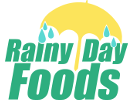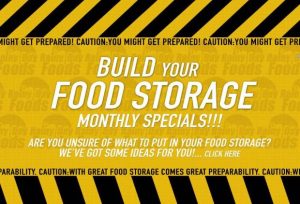You may be wondering why you should store food or other items “just-in-case” there’s an emergency. Many of us have a difficult time imagining the type of situation that would require emergency preparedness items or dehydrated and/or freeze dried food, especially if we have never experienced an emergency situation that would have used such items. Perhaps when you think of emergency preparedness and food storage, your mind goes to the idea of “preppers” and “bunkers” and that may seem to be beyond your ability to understand, let alone actually make happen. Not everyone has the space or financial ability to achieve that level of preparedness, but that does not mean that you can’t achieve a smaller level of preparedness.
But, how much should you store? It isn’t necessary to make a huge purchase that would provide enough food for a full year or more. A year’s supply is a perfect long term goal, but it may be less intimidating to make smaller goals as you begin. Perhaps starting with an extra month’s supply of food per person in your household would be more realistic. And if that still seems overwhelming, start with an extra week’s supply. When you achieve that, work on an extra two weeks’ supply. Emergency preparedness and food storage is best achieved one step at a time.
Buying an item or two at a time is a great and economical way to begin your food storage and emergency preparedness supply. You can do this by purchasing dried food from a reputable company that specializes in selling dehydrated and freeze dried foods for long term storage. You can also start a supply by purchasing a few extra items when you do your weekly grocery shopping – a few extra cans of soup or vegetables is a good way to get a little extra food stocked up for an emergency situation without putting a huge strain on an already tight budget. It may take longer to achieve your goal, but as your supply grows there will be a greater peace of mind knowing that you have a little something on hand “just-in-case”. Before you know it, you will have built your own food storage and emergency preparedness supply.


